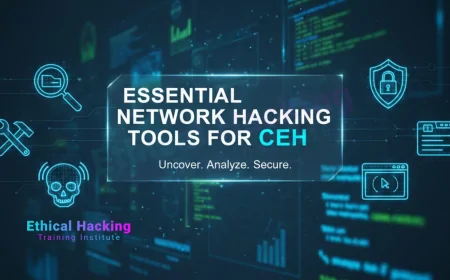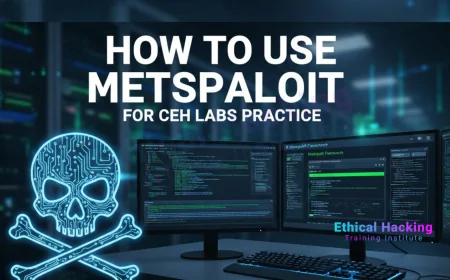Certified Penetration Testing Professional (CPENT) | Course Details, Syllabus & Career Scope
Explore complete details of the Certified Penetration Testing Professional (CPENT) course including syllabus, exam structure, skills learned, and career opportunities. Discover how CPENT training in Pune prepares you for real-world penetration testing and red teaming roles.

In an era of heightened cybersecurity threats, the demand for elite penetration testers is growing rapidly. Cyberattacks are becoming more advanced, and organizations across the world are actively looking for professionals who can ethically breach systems to identify and fix vulnerabilities before malicious actors do. If you're someone who wants to take cybersecurity expertise to the highest level, the Certified Penetration Testing Professional (CPENT) is one of the most advanced, respected, and intensive certifications to consider.
This blog provides a full breakdown of the CPENT certification, including its purpose, structure, exam details, skill outcomes, career benefits, and real-world relevance—while remaining entirely institute-agnostic.
What Is CPENT and Why Is It Important?
Certified Penetration Testing Professional (CPENT) is a globally recognized certification designed for advanced cybersecurity professionals. It assesses and builds deep-level skills in penetration testing, network exploitation, advanced web application attacks, and even OT (Operational Technology) testing. The course and exam push candidates to the extreme edge of ethical hacking and red teaming.
Unlike introductory certifications like CEH (Certified Ethical Hacker), CPENT is not about learning tools—it’s about applying real-world hacking techniques in a controlled environment under pressure, with high expectations.
Who Should Take CPENT?
CPENT is not for beginners. It's ideal for:
-
Experienced cybersecurity professionals looking to prove elite-level skills
-
Red team and blue team members seeking to upskill in adversarial simulation
-
Penetration testers aiming to specialize in advanced infrastructure and cloud attacks
-
Security analysts and consultants involved in incident response, ethical hacking, and system auditing
-
Network defense specialists preparing to shift toward offensive security roles
Before attempting CPENT, most candidates are expected to have:
-
Strong understanding of ethical hacking fundamentals
-
Experience with vulnerability analysis
-
Familiarity with Linux, Windows, scripting (Python/Bash), and networking
How CPENT Differs from Other Certifications
| Certification | Level | Focus | Key Difference |
|---|---|---|---|
| CEH | Beginner/Intermediate | Basic ethical hacking | Tool-based, foundational |
| OSCP | Intermediate | Real-world hacking | Hands-on, proctored exam |
| CPENT | Advanced | Enterprise-grade exploitation | Includes advanced skills like binary exploitation, OT hacking, and post-exploitation |
| CISSP | Management | Security leadership | Governance-focused, not technical |
| CISM | Management | InfoSec management | Risk and compliance-oriented |
CPENT stands out for its:
-
24-hour practical exam
-
Real-world cyber range environment
-
Coverage of modern attack surfaces like ICS, SCADA, and cloud
-
Unique dual-certification outcome (CPENT + LPT Master, based on exam score)
Key Skills You’ll Master in CPENT
The CPENT course is vast, intense, and realistic. Here are the core domains it covers:
1. Advanced Network Scanning and Enumeration
-
Discovering targets in complex environments
-
Leveraging custom scripts and tools
-
Bypassing firewalls and access control lists
2. Weaponizing Exploits
-
Exploiting buffer overflows on Windows and Linux systems
-
Writing custom exploits
-
Privilege escalation techniques
3. Web Application Attacks
-
Advanced XSS, SQLi, LFI/RFI, and server-side injection
-
Attacking modern frameworks and APIs
-
Web shell installation and remote code execution
4. Binary Exploitation and Reverse Engineering
-
Disassembling executables
-
Shellcode injection
-
Exploiting compiled applications
5. Cloud and IoT Hacking
-
Attacking AWS, Azure, and GCP environments
-
Leveraging misconfigured cloud storage
-
Penetration testing in hybrid architectures
6. Operational Technology (OT) Exploitation
-
SCADA/ICS environment attack simulation
-
Identifying vulnerabilities in critical infrastructure
7. Wireless Attacks
-
Breaking WPA/WPA2 encryptions
-
Packet injection and MITM
-
Rogue AP attacks
8. Post-Exploitation and Pivoting
-
Harvesting credentials
-
Lateral movement across segmented networks
-
Data exfiltration techniques
9. Writing Custom Scripts
-
Automating tasks using Python, Bash, or PowerShell
-
Scripting malware behavior
-
Customizing exploits for target environments
Course Duration and Structure
While the official content is built for self-study and practice-based learning, most intensive CPENT training programs are structured around the following components:
Duration
-
Typically 6 to 10 weeks (intensive format)
-
Daily or weekend batches available
-
Option to follow self-paced modules with instructor mentorship
Delivery Mode
-
On-site classroom bootcamps (for hands-on lab work)
-
Live virtual training with remote lab access
-
Self-paced online with recorded lectures, practice labs, and community access
Lab Access
-
Access to real-world cyber ranges simulating enterprise networks
-
Pre-configured vulnerable machines
-
Post-exploitation environments
Capstone Project
-
Participants are usually required to simulate a full red team operation as a final project.
-
Includes documentation, threat reports, and debriefing simulations
CPENT Certification Exam Details
This is what makes CPENT unique—its 24-hour practical exam format, split into two 12-hour segments:
Exam Format
-
Conducted in a fully proctored cyber range
-
Candidates have 24 hours to exploit targets and score as many points as possible
-
Two scoring thresholds:
-
70% to earn CPENT
-
90%+ to earn LPT (Master)
-
Challenges Include:
-
Exploiting firewalled networks
-
Gaining access to web and database servers
-
Pivoting through networks
-
Writing or modifying exploits
-
Exploiting IoT/OT infrastructure
Deliverables
-
Final report submission with:
-
Screenshots
-
Attack vectors
-
Logs
-
Vulnerability explanations
-
Exploitation steps
-
Why CPENT Is Considered Elite
Here’s what makes CPENT stand apart from other ethical hacking certifications:
-
Live Environment Exam: No multiple-choice questions—just raw skills.
-
Dual Outcome Exam: Possibility of earning two certifications in one attempt.
-
SCADA, Cloud & IoT Coverage: Extremely relevant for modern enterprises.
-
Emphasis on Thinking Like an Attacker: It’s not about tools; it’s about strategy, persistence, and creativity.
-
Post-Exploitation and Reporting: Simulates the full professional workflow of a penetration tester.
Benefits of Earning the CPENT Certification
High Industry Credibility
CPENT holders are considered experts, not beginners. Employers know you’ve passed a grueling exam and handled advanced attack scenarios.
Competitive Advantage in Hiring
The certification makes candidates stand out for:
-
Penetration testing roles
-
Cyber defense teams
-
Government, defense, and critical infrastructure jobs
-
Consulting and audit positions
Pathway to Red Team Roles
It prepares professionals to be part of elite red teams that simulate attacks against real organizations.
Global Recognition
Many international agencies, private firms, and government contractors accept CPENT for advanced penetration testing positions.
Career Opportunities After CPENT
Once certified, candidates can pursue roles such as:
-
Senior Penetration Tester
-
Red Team Specialist
-
Security Consultant
-
Application Security Engineer
-
Threat Intelligence Analyst
-
Ethical Hacking Lead
-
Vulnerability Assessment Manager
-
Cyber Forensics Specialist
Salary expectations vary by country and experience, but CPENT-certified professionals often earn 30% to 50% more than non-certified peers in similar roles.
Common Tools and Platforms Used in CPENT Training
-
Kali Linux, Parrot OS
-
Metasploit, Cobalt Strike
-
Burp Suite, OWASP ZAP
-
Hydra, John the Ripper, Hashcat
-
Impacket, Mimikatz, BloodHound
-
Python, Bash, PowerShell
-
Wireshark, Nmap, Nessus
-
ExploitDB, GitHub, VulnHub
Familiarity with these tools before enrolling is highly beneficial.
How to Prepare for CPENT Exam
1. Master the Fundamentals
Brush up on OSI model, networking concepts, protocols, and ports.
2. Practice Daily in Labs
Don’t rely on passive learning. Simulate attacks in a safe lab environment daily.
3. Write Reports
Learn how to document every step of your exploit process, from vulnerability to impact.
4. Strengthen Your Scripting
Python and Bash automation can help you solve tasks faster and more creatively.
5. Take Mock Exams
Replicating a 12–24-hour hacking session helps build endurance and technique.
Challenges You Might Face During CPENT
-
Time pressure during the 24-hour exam
-
Multiple attack paths with no obvious solutions
-
Complex network topologies that require pivoting
-
Balancing speed and stealth to avoid detection
-
Technical reporting which must be detailed and accurate
These are intentional. CPENT is designed to mimic real-world stress and complexity.
Is CPENT Worth It in 2025 and Beyond?
Absolutely. As threats evolve, so does the need for expert offensive security professionals. CPENT validates that you don’t just know how to hack—you can think like an attacker, adapt, and ethically defend.
In 2025, with the rise of:
-
AI-driven security tools
-
Zero Trust architecture
-
IoT-based vulnerabilities
-
Critical infrastructure threats
...having CPENT under your belt will keep your cybersecurity credentials at the top of the game.
FAQ's
What is the CPENT certification and why is it important?
The CPENT (Certified Penetration Testing Professional) certification is an advanced credential for cybersecurity professionals. It validates expertise in ethical hacking, red teaming, and real-world network exploitation. Its 24-hour practical exam tests advanced penetration skills, making it highly respected in the cybersecurity industry.
Who should enroll in a CPENT course in Pune?
The CPENT course in Pune is ideal for ethical hackers, penetration testers, red teamers, and security analysts with prior experience. It's recommended for professionals aiming to advance their careers in offensive cybersecurity and demonstrate elite-level skills in penetration testing and post-exploitation.
Is CPENT better than CEH or OSCP?
CPENT offers more advanced and broader coverage than CEH and includes real-world OT and cloud environments unlike OSCP. While CEH is beginner-friendly and OSCP is hands-on, CPENT pushes learners through complex enterprise simulations. It’s ideal for those seeking the next step in penetration testing.
What is the exam format for CPENT certification?
The CPENT exam spans 24 hours in a live cyber range, split into two 12-hour sessions. It challenges candidates with tasks like advanced exploitation, pivoting, and red teaming. Scoring above 70% earns CPENT, while 90%+ earns the prestigious LPT (Master) certification.
How long does it take to complete CPENT training?
Most intensive CPENT training programs in Pune last between 6 to 10 weeks, depending on the schedule. Weekend and fast-track batches are available. Some self-paced options can extend to 3 months for working professionals balancing full-time jobs and studies.
What topics are covered in the CPENT course?
The CPENT course covers network and web exploitation, binary analysis, cloud hacking, wireless attacks, OT/SCADA environments, privilege escalation, and custom exploit writing. It focuses on realistic simulations to develop comprehensive red team and advanced ethical hacking skills.
Do I need prior ethical hacking knowledge for CPENT?
Yes, CPENT is designed for professionals with prior experience in ethical hacking, networking, and scripting. Candidates should be comfortable with Linux, Windows environments, and common hacking tools. A CEH-level understanding is often considered the minimum prerequisite.
What tools are used in CPENT training programs?
CPENT training utilizes tools like Metasploit, Burp Suite, Wireshark, Mimikatz, BloodHound, Nmap, Hydra, and custom scripts in Python or PowerShell. Trainees also use platforms like Kali Linux and Parrot OS to simulate real-world penetration testing environments.
What are the career benefits of CPENT certification?
CPENT-certified professionals gain access to high-paying roles in cybersecurity, including penetration tester, red team expert, and cyber defense strategist. The certification enhances credibility and increases the chances of landing roles with defense contractors, MNCs, and critical infrastructure firms.
What kind of jobs can I get after completing CPENT?
CPENT opens doors to roles like Senior Penetration Tester, Red Team Specialist, Security Consultant, and Threat Intelligence Analyst. These positions often require advanced skills in offensive security and are among the most sought-after and high-paying in the cybersecurity field.
Is CPENT recognized internationally?
Yes, CPENT is globally recognized and respected by cybersecurity professionals, employers, and government agencies. Its dual certification structure (CPENT + LPT Master) enhances international job opportunities across industries that demand high-level red team capabilities.
Can beginners take the CPENT course in Pune?
CPENT is not recommended for complete beginners. However, individuals with foundational knowledge in ethical hacking, networking, and system security can prepare through bridge courses before enrolling in a CPENT-focused program in Pune.
How much does CPENT training cost in Pune?
The cost of CPENT training in Pune varies depending on course format (online, classroom, weekend). While prices can range widely, comprehensive programs typically include hands-on labs, mentorship, and exam prep, justifying a higher investment for professional advancement.
Does CPENT training include hands-on labs?
Yes, hands-on labs are a major component of CPENT training. Students work on real-world scenarios including live systems, vulnerable networks, and complex exploit simulations. Labs are designed to mirror enterprise IT environments for practical learning.
What is the CPENT exam pass score?
To pass the CPENT exam, a candidate must score at least 70%. Those who score 90% or above are awarded the prestigious LPT (Master) credential, which represents expert-level mastery in penetration testing and adversarial red teaming.
Can I take CPENT training on weekends in Pune?
Yes, many training providers in Pune offer weekend CPENT batches. These are ideal for working professionals who want to upskill without affecting their full-time job. Weekend courses typically run over several weeks with hands-on practice and mentoring.
Does CPENT training cover cloud and IoT security?
Absolutely. CPENT includes modules on cloud platforms like AWS, Azure, and Google Cloud. It also covers exploitation of IoT and SCADA devices, making it highly relevant for professionals targeting modern infrastructure vulnerabilities.
How does CPENT help in red team roles?
CPENT trains candidates to think like attackers, execute complex operations, and conduct full red team assessments. The course includes post-exploitation, pivoting, and data exfiltration, which are core skills for red team cybersecurity professionals.
Is there any project or final assessment in CPENT training?
Most CPENT training programs include a final red team simulation or capstone project. Learners are required to exploit a network, document vulnerabilities, and submit a detailed penetration testing report—similar to the real certification exam.
How do I prepare for the CPENT certification exam?
To prepare for CPENT, candidates should focus on daily lab practice, exploit development, scripting, and report writing. Practice exams, mock labs, and advanced security challenges will help simulate the 24-hour exam experience and boost readiness.
Final Thoughts: Is CPENT Right for You?
CPENT is not easy—but it is transformational. It demands commitment, strategy, and critical thinking. If you're ready to prove yourself at the cutting edge of ethical hacking and red teaming, CPENT is your next logical step.
Unlike theoretical certifications, CPENT validates your skill in a practical, no-compromise environment. Whether you’re aiming for a top-tier job, preparing to lead security operations, or working toward cybersecurity mastery, this course is one of the best investments you can make in your professional journey.
What's Your Reaction?
 Like
0
Like
0
 Dislike
0
Dislike
0
 Love
0
Love
0
 Funny
0
Funny
0
 Angry
0
Angry
0
 Sad
0
Sad
0
 Wow
0
Wow
0

















